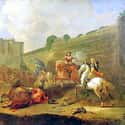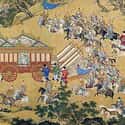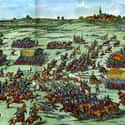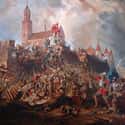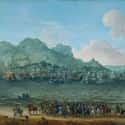-
(#8) 35,000 Men, Women, And Children Were Executed In Japan For Rebelling
In 1637, Christian peasants in Japan engaged in what was known as the Shimibara Rebellion. Like lots of other rebellions happening during the General Crisis, this revolt stemmed from famine, high regional taxes, official persecution - including execution by scalding in volcanic pits - and forced labor. The Tokugawa shogunate would eventually put down the revolution and behead over 35,000 men, women and children, essentially the remaining Christians not killed in the bloodshed. Government losses were estimated at double that of the Christian Japanese. Because Portuguese residents were considered the source of Christianity, all Westerners were expelled and forbidden to enter Japan, and Christianity was officially forbidden, policies that would remain in effect for over 250 years.
-
(#7) France Experienced Famine And A Revolution Before Its Official Revolution
140 years before the French Revolution, France was gripped by a five-year civil struggle called the Fronde, French for "sling" or "slingshot," which began in 1648. With Louis XIV only 10 years old at the time, the nobility resented the rule of the de facto leader of France, Cardinal Mazarin. Mass unrest began in Paris and spread throughout the country, with high taxes and hunger as two of the major complaints. Eventually, Louis XIV and Mazarin were forced to flee the country. The King would not return until 1652, when the violence subsided - but not before a great deal of death and property destruction.
-
(#1) China Experienced Famine, A Revolution, And A 50% Population Decline
The Little Ice Age - a period of intense cooling and violent weather change, spanning the 14th through the 19th centuries - had disastrous consequences in China during the General Crisis. Unusual cold and lack of rainfall precipitated an agricultural shortfall and widespread famine. Peasants were hungry and unable to pay taxes, so they revolted against the Ming Dynasty and overthrew their imperial rulers. This allowed Manchurian insurgents to invade the country and establish the Qing Dynasty. It is estimated that 50% of the Chinese population was lost during the unrest, which occurred during the first half of the 17th century.
-
(#4) The Thirty Years' War Wiped Out 20% Of Germany
One of the many population-crashing incidents that occurred during the era known as the General Crisis was the the Thirty Years War, a conflict that started in 1618 over religious issues concerning the Holy Roman Empire. By its conclusion in 1848, it would involve every major power in Europe, including France, Sweden, Spain, and Austria. Heavy use of mercenary armies in the War, along with their violet and brutal tactics, led to massive population losses in some places. Among German states, for example, there was a 20% population loss with some areas experiencing a decline of 50%. In 1648, the hostilities ended with the Treaty of Westphalia, but not before populations and industries had been totally wiped out.
-
(#3) There Was A "Deluge" In Which Every Country And Its Brother Invaded Poland
Poland and Lithuania had been able to avoid involvement in the Thirty Years War, but, in 1648, Ukrainian and Cossack elements revolted against the various Polish and Lithuanian noblemen who ruled over the ethnically diverse areas. This event precipitated what was known as "The Deluge," which involved Russian elements in conflict with the Poles and Lithuanians and ultimately resulted in a great loss of territory to Russia after the war concluded almost 20 years later. Sweden, also an emerging regional power, saw this conflict as an opportunity to invade Poland itself, precipitating another bloody conflict that would not be resolved until 1660.
-
(#12) Spain Lost Its Status As A World Power
The 17th century introduced a decline, both politically and economically, in Spain. Philip II, the last great ruler of the Spanish Empire, died in 1598. In addition, the Spanish military was greatly affected by the 1588 disaster of the Spanish Armada. Spain's military power would be further diminished by another naval disaster in 1639 as well as defeat at the hands of France in 1643. Plague greatly reduced the population throughout the century, especially in the formerly prosperous towns of Grenada, Segovia, and Toledo, resulting in economic recession. In 1630, Spain had an army estimated at 300,000 men; by 1700, this had been reduced to 50,000.
New Random Displays Display All By Ranking
About This Tool
Since the 20th century, Western academia has conducted a debate around the general crisis of the 17th century, which has promoted the understanding of early modern European history. The 17th century was a period of such an important and intense crisis. This period was a crucial transition in the development of European society from the Middle Ages to modern society.
The world experienced the economic recession, rising population mortality, bourgeois revolution, social turmoil, and many other social problems, global connections were also strengthened during this period. The random tool described 13 details about the harsh life of the general crisis.
Our data comes from Ranker, If you want to participate in the ranking of items displayed on this page, please click here.












